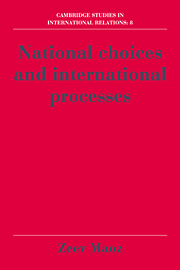Book contents
- Frontmatter
- Contents
- List of figures
- List of tables
- Preface
- 1 Toward a theory of international processes
- 2 Foreign policy decision making: assumptions and characterization of the approach
- 3 The inputs of decision making: identification and conceptualization
- 4 The essential mathematics of inputs
- 5 Models of the decision process
- 6 A formal characterization of decision processes
- 7 A theory of foreign policy decision making
- 8 The analysis of international outcomes
- 9 The evolution of international processes
- 10 Individual preferences, national choices, and international systems
- References
- Name Index
- Subject Index
6 - A formal characterization of decision processes
Published online by Cambridge University Press: 05 February 2012
- Frontmatter
- Contents
- List of figures
- List of tables
- Preface
- 1 Toward a theory of international processes
- 2 Foreign policy decision making: assumptions and characterization of the approach
- 3 The inputs of decision making: identification and conceptualization
- 4 The essential mathematics of inputs
- 5 Models of the decision process
- 6 A formal characterization of decision processes
- 7 A theory of foreign policy decision making
- 8 The analysis of international outcomes
- 9 The evolution of international processes
- 10 Individual preferences, national choices, and international systems
- References
- Name Index
- Subject Index
Summary
INTRODUCTION
In this chapter I develop a set of formal procedures for the empirical discrimination among the three decision process models discussed in chapter 5. These procedures consist of deductions derived from the analytic, cybernetic, and cognitive models with respect to individual choice and collective decision processes. The deductions are based on an integrative framework of foreign policy decision making developed by Stein and Tanter (1980) and extended by Maoz (1981; 1986).
In chapter 5, I pointed out that although it was readily admitted that the various choice models complement rather than contradict each other, no systematic effort was made either to integrate these models or to rigorously discriminate among them. The literature was characterized by a fundamental disagreement among scholars regarding which of the models best approximates real-world foreign policy decision processes. This was the point of departure of several studies belonging to the synthesis stage. In this chapter I will discuss one such study. In chapter 7, I will review the stage of synthesis in more detail.
The present chapter is designed as follows. First, I outline the Multiple Paths to Choice (hereafter, MPC) framework. Second, I discuss the formal aspects of individual choice processes that can be deduced from this framework. Third, I show how this framework – originally restricted to individual choice processes – can be extended to the analysis of collective decision processes.
- Type
- Chapter
- Information
- National Choices and International Processes , pp. 224 - 303Publisher: Cambridge University PressPrint publication year: 1990

